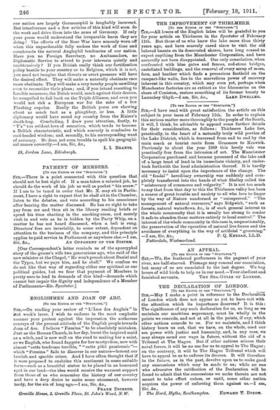... EDITOR or TEE " SPECTATOR.") Sre,—I have read with
great satisfaction the article on this subject in your issue of February 11th. In order to explain this serious matter more thoroughly to the people of the South, it will, I think, be advisable to append some further details for their consideration, as follows : Thirlmere Lake lies, practically, in the heart of a naturally truly wild portion of the Lake District, which is traversed from end to end by the main coach or tourist route from Grasmere to Keswick. Previously to about the year 1889 this lovely vale was practically free from the intrusion of art. The Manchester Corporation purchased and became possessed of the lake and of a large tract of land in its immediate vicinity, and under- took forthwith the local administration thereof. It is hardly necessary to insist upon the importance of the change. The old "feudal" hereditary ownership was suddenly and com- pletely transferred into the hands of what Shelley called the " aristocracy of commerce and vulgarity." It is not too much to say that from that day to this the Thirlmere valley has been a source of great trouble and anxiety to all who love to linger by the way of Nature unadorned or "unimproved." "The management of natural resources," says Sidg, wick, " such as forests, natural waterilows, &e., is of such general interest to the whole community that it is usually too strong to render it safe to abandon these matters entirely to local control." The interest of the whole community in this case is, unquestionably, the preservation of the operation of natural live forces and the avoidance of everything in the way of artificial " grooming?'






































 Previous page
Previous page